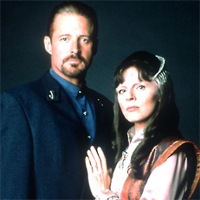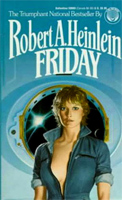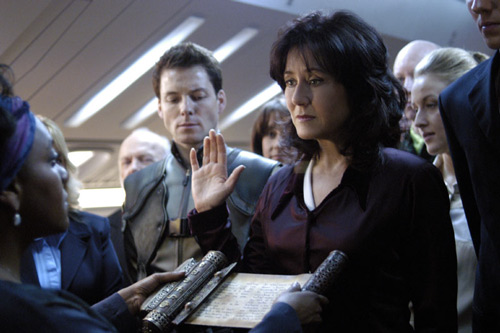I was at FenCon over the weekend. No, I’m not posting as in-depth a recap as I did for WorldCon, but here are a few highlights.
On the interstellar wars that populate so much space opera, there are two extremes to think about. At one end of the spectrum is when you only want to exterminate the enemy. In that case, planets can be fixed, vulnerable targets. Just send in enough high-speed asteroids, and even with a good planetary defense, a reasonable number of them are going to get through and wipe out the biosphere. But at the other end, you ultimately want to capture planets intact. Even if you intend to exterminate the population, you want that biosphere mostly intact for your own people. In that case, no matter how many ships in your armada, there is no substitute for boots on the ground. So, with all deference to the space navies, you’re often looking at either asteroids or infantry as your ultimate solution.
On all the dystopias we’ve seen lately, perhaps it’s not quite so gloomy as you might think. In many of the dystopia’s of old, like 1984, the oppressors were able to crush the human spirit. Even with love and intelligence and the need to be free, Winston could not withstand the might of the state. “If you want a vision of the future, Winston, imagine a boot stamping on a human face forever.” In short, society was so badly broken that there was no escape from it. However, many of the more modern dystopia tales are actually stories of dystopias being overthrown or otherwise resisted. The Hunger Games is a good example of this. In that sense, perhaps we should not be too depressed, since in some ways at least, these are uplifting tales.
And a little Babylon 5 tidbit… I had completely missed this when it came out in May, but Joe Straczynski revealed why Michael O’Hare (the actor playing Sinclair) really left Babylon 5 after only one season. From Slice of Sci-Fi:
According to JMS, O’Hare suffered from delusions and paranoia due to mental illness.
That was the real reason he left the show after only one season. Straczynski explained how O’Hare struggled, how he was barely able to come back for a two-parter to close his character’s story, but above all, that O’Hare wanted people to know the truth after his death.
And the most important truth of O’Hare’s struggle with mental illness is that he loved the fans, that they were what sustained him during the difficult times in his life.
The article also links to some video of that conference.
It was a lot less intense than WorldCon, but I still had an excellent time. Cory Doctorow said a lot of interesting things around copyright and DRM, and it was fun seeing all the usuals from Texas fandom. I’m already signed up for next year, but this pretty much closes my con season. There will be an Austin ComicCon most likely later in the year, but I’ve never managed to go to one yet, and I see no reason this year will be suddenly different.


 On the fantasy side, Lord of the Rings had Aragorn marry Arwen with hints of half-elf children in their future. I’ve seen a few human-demon pairings as well as human-vampire pairings, but very few actual weddings. (Sorry, I’m not aware of anything called Twigh Lite.)
On the fantasy side, Lord of the Rings had Aragorn marry Arwen with hints of half-elf children in their future. I’ve seen a few human-demon pairings as well as human-vampire pairings, but very few actual weddings. (Sorry, I’m not aware of anything called Twigh Lite.) Then we get into different kinds of marriage. Heinlein was all over this with both line marriages in The Moon is a Harsh Mistress and group marriages in Friday. Some of these were meant to preserve property, while others were simply a raised finger to the institution of monogamous marriage.
Then we get into different kinds of marriage. Heinlein was all over this with both line marriages in The Moon is a Harsh Mistress and group marriages in Friday. Some of these were meant to preserve property, while others were simply a raised finger to the institution of monogamous marriage. Now, if that hasn’t completely detonated the nuclear family, I’ve heard of even stranger arrangements, where the aliens in question were sentient symbiots, so simple pairings were by definition group marriages. Taking it further, there are some fictional races that live in between individual sentience and shared hive minds, so the notion of marriage for love vs. arranged marriage is dropped into the conceptual blender and thoroughly pureed.
Now, if that hasn’t completely detonated the nuclear family, I’ve heard of even stranger arrangements, where the aliens in question were sentient symbiots, so simple pairings were by definition group marriages. Taking it further, there are some fictional races that live in between individual sentience and shared hive minds, so the notion of marriage for love vs. arranged marriage is dropped into the conceptual blender and thoroughly pureed.